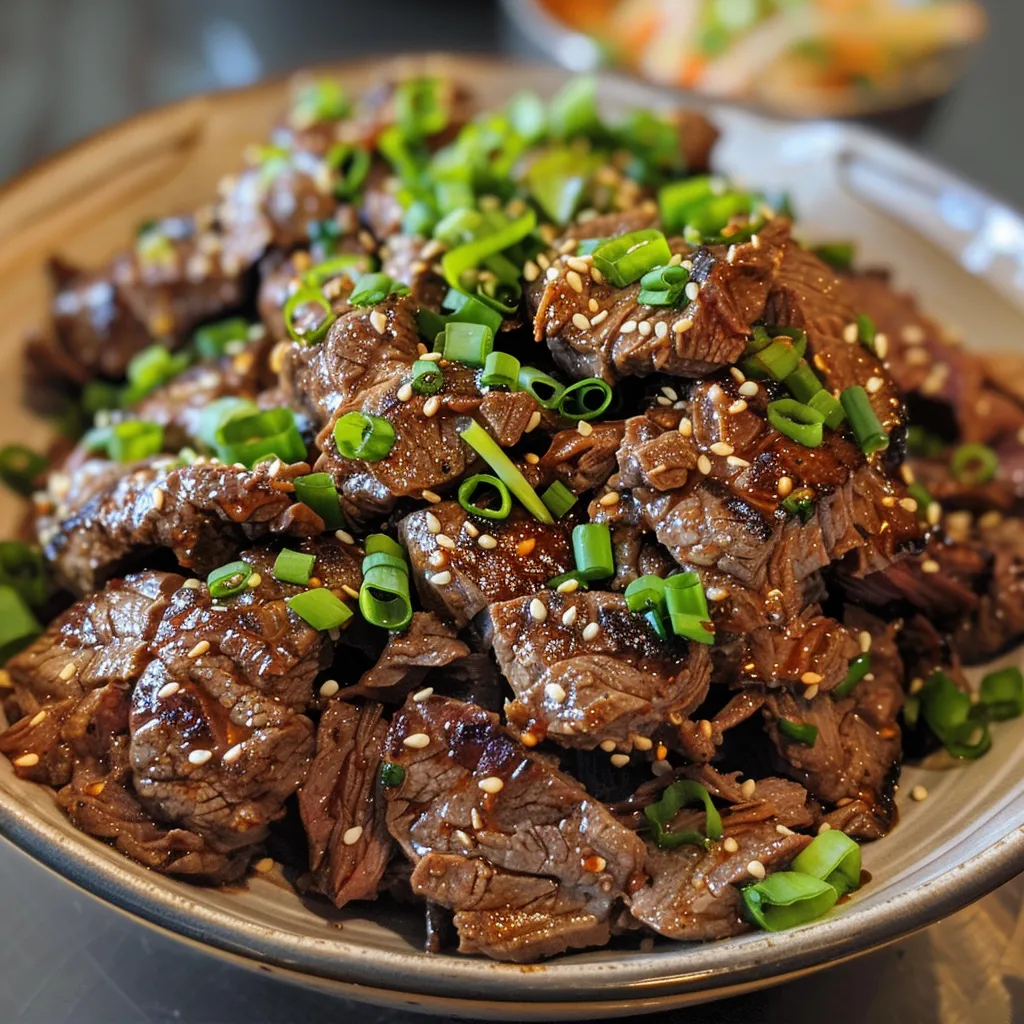Are you ready to elevate your weeknight dinner ideas with a dish that’s bursting with flavor? I’m so excited to share my Korean Beef Bulgogi Marinade recipe with you! This marinade is not only easy to whip up, but it also transforms ordinary beef into a tender, juicy delight that your family will rave about. Plus, it’s perfect for those quick family dinners when you want something delicious without spending hours in the kitchen. Let’s dive in!
Why You’ll Love This Recipe
- Quick and easy to prepare, making it perfect for busy weeknights.
- Transforms tough cuts of beef into tender, flavorful bites.
- Versatile—great for grilling, stir-frying, or pan-frying.
- Pairs beautifully with rice, veggies, and even kimchi!
- Can be made ahead of time for even more flavor.
Ingredients
To make this mouthwatering Bulgogi Recipe, you’ll need the following ingredients:
- 2 lb top sirloin steak, thinly sliced
- ½ cup soy sauce
- ½ cup brown sugar
- 2 tbsp minced garlic
- 1 tbsp grated ginger
- 1 tbsp sesame oil
- 2 tbsp mirin
- 1 tbsp rice vinegar
- 1 Korean pear, grated
- ½ tsp ground black pepper
- 2 green onions, finely chopped
- 1 tsp sesame seeds (optional)
Full ingredient list with measurements is provided in the printable recipe card below.
How to Make the Recipe
Now, let’s get cooking! Follow these simple steps to create your own Bulgogi Marinade:
- Mix the marinade: In a large bowl, combine the soy sauce, brown sugar, minced garlic, grated ginger, sesame oil, mirin, rice vinegar, grated Korean pear, black pepper, green onions, and sesame seeds if you’re using them. Stir until the sugar is dissolved and everything is well mixed.
- Marinate the beef: Add the thinly sliced steak to the marinade, ensuring each piece is coated. Cover the bowl and refrigerate for at least 1 hour (or overnight for the best flavor!).
- Cook the bulgogi: Grill, stir-fry, or pan-fry the marinated beef over medium-high heat in batches to avoid overcrowding. Cook until the beef is caramelized and just cooked through, about 3-5 minutes.
- Serve: Serve your delicious bulgogi over steamed rice, accompanied by kimchi, a fried egg, and fresh veggies like cucumbers and carrots.
Pro Tips for Making the Recipe
Here are some of my favorite tips to ensure your Korean Beef Bulgogi turns out perfectly every time:
- For the best flavor, marinate the beef overnight. The longer it sits, the more tender and flavorful it becomes!
- If you can’t find a Korean pear, a regular pear or even an apple can work in a pinch.
- Don’t overcrowd the pan when cooking; this helps achieve that beautiful caramelization.
- Feel free to customize the marinade by adding your favorite spices or even a splash of hot sauce for a kick!
How to Serve
When it comes to serving your Bulgogi Beef, the options are endless! Here are a few ideas:
- Serve over fluffy steamed rice for a comforting meal.
- Wrap the beef in lettuce leaves for a fresh, low-carb option.
- Pair with a side of Beef Stir Fry for a complete feast.
- Top with sesame seeds and extra green onions for a beautiful presentation.
Make Ahead and Storage
This Bulgogi Marinade is perfect for meal prep! Here’s how to store it:
- Marinated beef can be stored in the refrigerator for up to 2 days before cooking.
- If you have leftovers, store them in an airtight container in the fridge for up to 3 days.
- Reheat gently in a skillet or microwave, and serve over fresh rice or noodles.
And there you have it! A delicious, easy-to-make Korean Beef Bulgogi that’s sure to impress your family and friends. Whether you’re looking for quick family dinners or just want to try something new, this recipe is a winner. Don’t forget to check out my other Mongolian Beef recipe for another tasty option. Happy cooking!

Korean Beef Bulgogi Marinade
Ingredients
Method
- Combine soy sauce, sugar, garlic, ginger, sesame oil, mirin, vinegar, pear, pepper, green onions, and sesame seeds in a bowl.
- Add beef slices to marinade, coat well, and refrigerate for at least 1 hour.
- Cook beef over medium-high heat until caramelized and cooked through.
- Serve over rice with kimchi, fried egg, and fresh vegetables.

